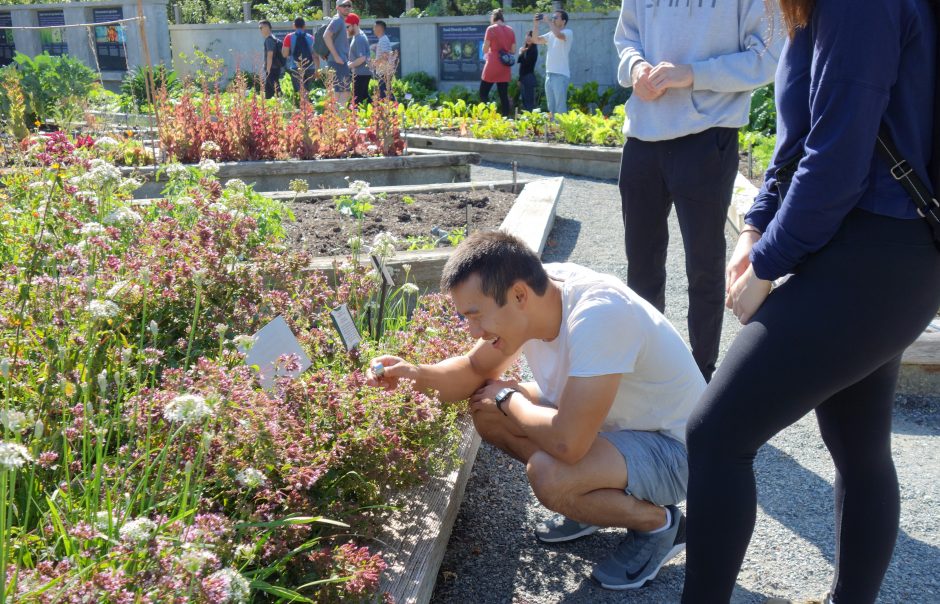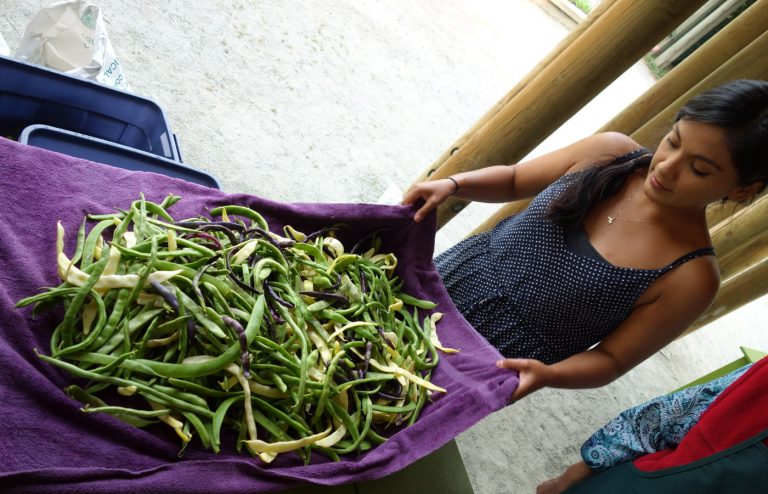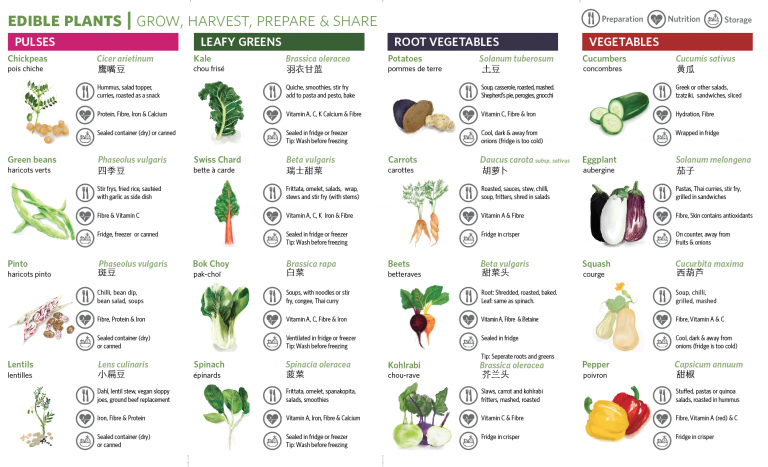
Masters of Geomatics for Environmental Management (MGEM) student smiling and inspecting crops at UBC Botanical Food Garden.
Food insecurity is a rising issue across Canadian universities and UBC is no exception. But UBC students are leveraging their knowledge to create solutions to food insecurity.
Food insecurity identifies the lack of access to healthy and consistent sources of food that certain vulnerable populations experience [1]. With the increasing effects of climate change, food insecurity becomes a more prevalent and urgent issue. In 2015, the United Nations established Goal 2: Zero Hunger to tackle food insecurity as part of their Sustainable Development Goals, a global campaign to create a sustainable and prosperous future.
39 % of students at five Canadian universities reported experiencing some form of food insecurity according to a 2016 survey from Meal Exchange, a charity focused on improving food on Canadian campuses. Though UBC was not one of the five campuses surveyed, a UBC Social Ecological Economic Development Studies (SEEDS) report classified 45% of undergraduate respondents as food insecure.
“As students, I don’t think we should have to worry about getting healthy, nutritious, and filling meals and knowing where those were going to come from each day,” said Simran Sidhu, UBC biology undergraduate alum and 2018-2019 coordinator of the AMS Food Bank.
Sidhu represented the interests of the AMS Food Bank for the Harvesting Food Skills program co-hosted by UBC Botanical Garden. But she is just one of the students involved with the collaborative Harvesting Food Skills Program.
Iris Lopez Ramirez, a Dietetics student in the Food, Nutrition and Health faculty, brought a wealth of nutritional knowledge to the program. Emma Ng, an undergraduate student and member of UBC’s Roots of the Roof, was a designer and illustrator for the program. Ilan Wright, Dietetics practicum student at UBC, provided cooking instructions and education materials to students at workshops.
To Tara Moreau, Associate Director of Sustainability and Community Programs at UBC Botanical Garden, getting students involved in leadership roles with the program is pivotal.
“It’s leveraging the strengths of students because this is designed for students,” said Moreau. “It’s co-creating a product that we feel serves their peers.”

Student harvesting beans in the Food Garden.
Bridging the gap between academic performance and food insecurity
Food insecurity on campus presents an additional barrier that prevents students from performing at their peak academic potential, in addition to the other stresses of being a student.
“There’s already so many other pressures and things that students need to worry about as students at UBC,” said Sidhu.
Meal Exchange reports that students experiencing food insecurity can struggle to prioritize school-related tasks and may have a lower GPA than their food-secure peers.
For Sidhu, the Harvesting Food Skills program and the Food Bank are ways to bridge the gap between academic performance and food insecurity by improving student accessibility to food literacy and reducing barriers to food security.
She says the services from the collaborative Harvesting Food Skills program helps students that are struggling with food insecurity “to be able to still succeed academically and not have any disadvantages compared to other students.”
Wright helped make healthy eating accessible to students through his cooking workshops.
“I am a chef by trade and tried to incorporate tips and tricks to make cooking easier,” said Wright.
In his cooking instructions at the workshops, he incorporated key nutritional information that is relevant and digestible to students. As a student himself, Wright acknowledges how important it is to ensure that students with limited resources are not intimidated by healthy eating.
“We all have to eat, but not everyone has the right tools for success. Especially when it comes to students, we have to have services that support the development of food skills,” he said.

UBC Botanical Garden’s new Food Guide Brochure. Download the brochure.
Looking ahead
While the workshops provided students with farm-to-table experience preparing healthy food, the Food: Edible Plant Identification and Nutrition Guide poster and brochure will serve as a resource for students to bring home and use in their kitchens. With the brochure, the program can continue to help clients who weren’t able to attend the workshops with their food knowledge.
The brochure will eventually be reproduced as a large poster that will be located at the AMS Food Bank. The poster will be an art piece and reminder of the importance and simplicity of healthy eating, while students can take the paper brochures home with them.
“We want students to not feel intimidated by fresh produce and feel confident in their abilities to take produce home and cook it, prepare it, eat it, and enjoy it,” said Sidhu.
Sidhu and the other student leaders from the collaborative Harvesting Food Skills Program program are mobilizing to address food insecurity on campus, an issue that matters to students.
“It’s important because we’re a community and we have a responsibility to help and look after those who we share this community with,” said Sidhu.
For more resources, we recommend the following:
UBC Wellbeing Food and Nutrition
UBC Action Framework for a Nutritionally Sound Campus
[1] United Nations (n.d.). Goal 2: Zero Hunger.
Submitted by: Braela Kwan, Former UBC Botanical Garden Marketing and Communications student employee and Master of Journalism student.
